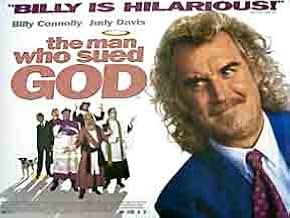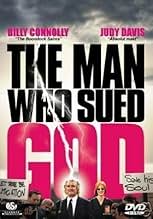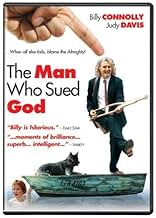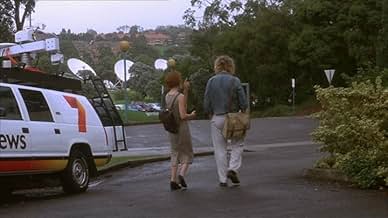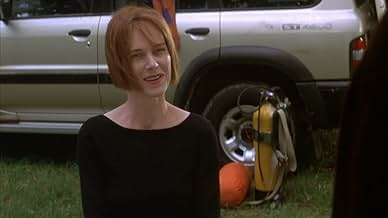The Man Who Sued God
- 2001
- 1 h 37 min
AVALIAÇÃO DA IMDb
6,4/10
5,3 mil
SUA AVALIAÇÃO
Adicionar um enredo no seu idiomaAn ex lawyer now fisherman sees his fishing boat sunk by a lightning. His insurance company claims "Act of God". Sue the insurance company or God/churches?An ex lawyer now fisherman sees his fishing boat sunk by a lightning. His insurance company claims "Act of God". Sue the insurance company or God/churches?An ex lawyer now fisherman sees his fishing boat sunk by a lightning. His insurance company claims "Act of God". Sue the insurance company or God/churches?
- Direção
- Roteiristas
- Artistas
- Prêmios
- 1 indicação no total
Avaliações em destaque
The Man Who Sued God
Some might find The Man Who Sued God audacious, perhaps sacrilegious, certainly rebellious. Most will find it very funny.
Steve (Billy Connolly) sees his boat blown up by lightening and the insurance company won't pay up, citing the Act Of God defense against the claim.
Steve, a runaway lawyer, decides to sue God, and his/her representatives, the Churches for the money. It would seem that the Churches could well have to argue against the existence of God to defend the case.
Now no doubt there are good legal reasons why the above couldn't happen although it's usual that whenever theology gets bantered about the arguments never seem to make much real sense.
But in the hands of director Mark Joffe (Cosi, Spotswood), writers John Clark, a.k.a. Fred Dagg (The Gilles Report,) and Don Watson (The Gilles Report, Passion), as well as a terrific cast headed by the wild and wooly Billy Connolly we are given plenty of fun moments.
A lot of the humour is visual a dog flung above a jetty, Judy Davis as Anna falling into the sea, Anna and Steve's first meeting in a restaurant. Then there's Connolly who has an nicely mad, every man, quality exuding from him that manages to grab humour out of even a hideously pierced foot.
Then there's the photography, the look of the film. There's an early storm scene which is a little disquieting as all really good storms should be and from then on we see cloud scenes that are entrancing.
Judy Davis lends her trademark intensity to her work in a film where nearly everyone seems to gel, even if Wendy Hughes as Jules seems forced in her performance. The ideas are lively if confused and there's a lovely surrealistic touch or two that gives this movie a depth far beyond comedy.
And if you crave a good belly laugh or two The Man Who Sued God delivers.
4 Lively Flys
Some might find The Man Who Sued God audacious, perhaps sacrilegious, certainly rebellious. Most will find it very funny.
Steve (Billy Connolly) sees his boat blown up by lightening and the insurance company won't pay up, citing the Act Of God defense against the claim.
Steve, a runaway lawyer, decides to sue God, and his/her representatives, the Churches for the money. It would seem that the Churches could well have to argue against the existence of God to defend the case.
Now no doubt there are good legal reasons why the above couldn't happen although it's usual that whenever theology gets bantered about the arguments never seem to make much real sense.
But in the hands of director Mark Joffe (Cosi, Spotswood), writers John Clark, a.k.a. Fred Dagg (The Gilles Report,) and Don Watson (The Gilles Report, Passion), as well as a terrific cast headed by the wild and wooly Billy Connolly we are given plenty of fun moments.
A lot of the humour is visual a dog flung above a jetty, Judy Davis as Anna falling into the sea, Anna and Steve's first meeting in a restaurant. Then there's Connolly who has an nicely mad, every man, quality exuding from him that manages to grab humour out of even a hideously pierced foot.
Then there's the photography, the look of the film. There's an early storm scene which is a little disquieting as all really good storms should be and from then on we see cloud scenes that are entrancing.
Judy Davis lends her trademark intensity to her work in a film where nearly everyone seems to gel, even if Wendy Hughes as Jules seems forced in her performance. The ideas are lively if confused and there's a lovely surrealistic touch or two that gives this movie a depth far beyond comedy.
And if you crave a good belly laugh or two The Man Who Sued God delivers.
4 Lively Flys
When events happen that are not within predictable range, and there seems nothing for it but accept it as an act of god, many people accept it as inevitable. That's well and good for little things, but not when the event is ruinous, destructive or major. And especially when it's an event that causes a loss' where that loss was covered by insurance.
That sort of loss befell our man, played with insight, verve and delicacy by Billy Connolly, in 'The Man Who Sued God'. What's important about this movie is that it's not about Billy Connolly, it's not him mugging for the camera and pulling stunts. It's a drama about a man in a tough situation, with romantic and comedic elements included. It's well written, played with truth and energy by the entire cast, and shot vividly, both for the exterior scenes of 'beautiful OZ', and the interiors, where so much of the action takes place.
He's just had his fishing boat blown out of the water by a direct hit from lightening, and it's all covered by insurance. Until the small print comes into play, and the company refuses to pay, saying that the lightning strike was an act of God. There is no other recourse than the Courts, and our man sues God for the loss of his boat and livelihood.
He sues all denominations of religion, as the servants and agents of God on Earth, and they all hire lawyers. It begins to look a bit like 'The Verdict' for a while, but the interplay between the different religions turns the action from that path, prior to deja vu setting in. There's courtroom drama that rings true, and interpersonal that carries the story forward without resorting to artificial devices. It's a drama with comedic moments and a romantic element, in a warm and compact package, which is a good thing.
All in all, a feel-good movie without the smarminess -you can feel good about liking this one.
That sort of loss befell our man, played with insight, verve and delicacy by Billy Connolly, in 'The Man Who Sued God'. What's important about this movie is that it's not about Billy Connolly, it's not him mugging for the camera and pulling stunts. It's a drama about a man in a tough situation, with romantic and comedic elements included. It's well written, played with truth and energy by the entire cast, and shot vividly, both for the exterior scenes of 'beautiful OZ', and the interiors, where so much of the action takes place.
He's just had his fishing boat blown out of the water by a direct hit from lightening, and it's all covered by insurance. Until the small print comes into play, and the company refuses to pay, saying that the lightning strike was an act of God. There is no other recourse than the Courts, and our man sues God for the loss of his boat and livelihood.
He sues all denominations of religion, as the servants and agents of God on Earth, and they all hire lawyers. It begins to look a bit like 'The Verdict' for a while, but the interplay between the different religions turns the action from that path, prior to deja vu setting in. There's courtroom drama that rings true, and interpersonal that carries the story forward without resorting to artificial devices. It's a drama with comedic moments and a romantic element, in a warm and compact package, which is a good thing.
All in all, a feel-good movie without the smarminess -you can feel good about liking this one.
"The Man Who Sued God" - well, right from the start, it's an attention-grabbing name.
The story of retired lawyer Steve Myers (Billy Connolly), whose boat is struck by lightning and, well, he wouldn't beat the insurance companies, so theres gotta be _someone_ to sue, is... interesting to say the least. Connolly and Judy Davis are great, Billy in particular being roaringly funny at some points. Although for all its funniness the film raises some interesting questions as well, like: can the churches sue insurance companies for "breach of copyright" on the phrase "Acts of God"?
A great film.
The story of retired lawyer Steve Myers (Billy Connolly), whose boat is struck by lightning and, well, he wouldn't beat the insurance companies, so theres gotta be _someone_ to sue, is... interesting to say the least. Connolly and Judy Davis are great, Billy in particular being roaringly funny at some points. Although for all its funniness the film raises some interesting questions as well, like: can the churches sue insurance companies for "breach of copyright" on the phrase "Acts of God"?
A great film.
Everyone seems to be taking this movie waaaaaaay too seriously. Billy Connolly is terrific and the story is wonderful. A great feel good movie and except for the non-stop obscenities, would be a great family film. Terrific writing and great delivery. It's not meant to be an academy award winning drama...it's a comedy for heaven's sake. I never even knew who Billy Connolly was, and now I'm a fan. He's irreverent and incredibly funny, kind of like a Scottish George Carlin. People are complaining about the end, but even though it's a little hokey, it's still enjoyable. If you want to watch a movie with an unbelievably bad ending, watch Russel Crowe in 3:10 to Yuma. Now there's a bad ending.
Scottish stand up comedian Billy Connolly (recently featured in The Last Samurai) plays divorced and disillusioned ex-lawyer Steve Myers, who now whiles away his time on a fishing boat in New South Wales, Australia. One afternoon his boat, which is now basically his life, is destroyed by a bolt of lightning, which also results in a chard of the hull being embedded in his foot. On crutches he approaches his insurance company who refuse to pay as the incident is deemed an 'Act of God'. Connolly's traditional Celtic brand of outrageous, yet amusing, expletives result in his being carried unceremoniously out of the building. Undeterred by this he decides to challenge the very meaning of the term 'Act of God', which by it's very nature determines that someone (in this case God) is responsible, and if someone (God) is responsible then they (or He) can therefore be sued
or at least their (or His) representatives can. The subsequent court case generates a media storm as Myers, a not unaccomplished and uncharismatic courtroom tactician, initially runs rings around his opponents. Thus begins the David and Goliath battle between the little man and the formidable powers of the Church and the massive legal and insurance firms in their employ. Myers also gathers 800 or so co-plaintiffs, all victims of the 'Act of God' clause, to support him in his case. It eventually gets to the point where it looks like the only way the church are going to win their case is to prove that God doesn't exist. It's a clever, simple premise and one you wish you'd thought of yourself.
It's no coincidence that Connolly's character is a fisherman, or even a fisher of men, and that his beef is with the corrupt insurance companies representing an apparently corrupt church. If it was suddenly discovered that Christ was Scottish, then it would have been Connolly calming the storm out on the Sea of Galilee, and Connolly who threw the moneylenders out of His Father's house, and, hirsute and ranting as he is in this movie, impressive he would have been too. Billy Connolly as Christ now that would even give Mel Gibson a run for his money I bet he'd be great at parting the Red Sea oh, no, that was Moses wasn't it. Never mind, he could play that role too (nobody seems to worry about accents in movies anyway) and in fact he almost pleads to the court on behalf of his co-plaintiffs 'Let my people go', or rather 'Give my people their money you bastards', but with a smile and a twinkle in the eye that only Connolly can get away with well, him and Sean Connery. Why haven't they been teamed up in a movie? It seems like a match made in Heaven to me.
There are many storms brewing toward the end of the film; Religious zealots surround the courthouse hurling abuse at the blasphemer Myers; Myers can't afford to lose the case; the lawyers can't afford to either, nor can the church, and there's also a mighty wind storm approaching the town bringing forest fires and floods (and no doubt frogs, plague and locusts) with it. Needless to say it's a happy ending, the lawyers and the church get their knuckles rapped, the image of God remains untarnished (of course), Myers gets the girl and the zealots go home sulking and dragging their large wooden cross with them in another Christ reference.
It's a refreshing film, as most Australian movies are. There's great attention to character and background detail. Connolly (Water, Mrs. Brown, Muppet Treasure Island, Boondock Saints, Timeline), undoubtedly a talented actor and comedian, is obviously cast for distribution purposes (Myers isn't a particularly Scottish name after all) and seems a little out of place in the Australian backdrop, but his rants are very funny. Veteran and versatile Australian actress Judy Davis (Deconstructing Harry, Celebrity, Absolute Power, The Reagans), as Myers' journalistic co-conspirator and love interest, is subject to some slapstick humour as a drunken and literally legless Myers wrecks a restaurant, and the excellent supporting cast are all the more convincing for their unfamiliarity.
It's no coincidence that Connolly's character is a fisherman, or even a fisher of men, and that his beef is with the corrupt insurance companies representing an apparently corrupt church. If it was suddenly discovered that Christ was Scottish, then it would have been Connolly calming the storm out on the Sea of Galilee, and Connolly who threw the moneylenders out of His Father's house, and, hirsute and ranting as he is in this movie, impressive he would have been too. Billy Connolly as Christ now that would even give Mel Gibson a run for his money I bet he'd be great at parting the Red Sea oh, no, that was Moses wasn't it. Never mind, he could play that role too (nobody seems to worry about accents in movies anyway) and in fact he almost pleads to the court on behalf of his co-plaintiffs 'Let my people go', or rather 'Give my people their money you bastards', but with a smile and a twinkle in the eye that only Connolly can get away with well, him and Sean Connery. Why haven't they been teamed up in a movie? It seems like a match made in Heaven to me.
There are many storms brewing toward the end of the film; Religious zealots surround the courthouse hurling abuse at the blasphemer Myers; Myers can't afford to lose the case; the lawyers can't afford to either, nor can the church, and there's also a mighty wind storm approaching the town bringing forest fires and floods (and no doubt frogs, plague and locusts) with it. Needless to say it's a happy ending, the lawyers and the church get their knuckles rapped, the image of God remains untarnished (of course), Myers gets the girl and the zealots go home sulking and dragging their large wooden cross with them in another Christ reference.
It's a refreshing film, as most Australian movies are. There's great attention to character and background detail. Connolly (Water, Mrs. Brown, Muppet Treasure Island, Boondock Saints, Timeline), undoubtedly a talented actor and comedian, is obviously cast for distribution purposes (Myers isn't a particularly Scottish name after all) and seems a little out of place in the Australian backdrop, but his rants are very funny. Veteran and versatile Australian actress Judy Davis (Deconstructing Harry, Celebrity, Absolute Power, The Reagans), as Myers' journalistic co-conspirator and love interest, is subject to some slapstick humour as a drunken and literally legless Myers wrecks a restaurant, and the excellent supporting cast are all the more convincing for their unfamiliarity.
Você sabia?
- CuriosidadesThe Bollywood movie OMG: Oh My God! (2012), starring Akshay Kumar and Paresh Rawal, was inspired by this movie.
- Erros de gravaçãoWhen Dave throws the newspaper on top of Steve as he's lying in bed, the second shot of Steve shows no newspaper lying on his upper body, but the third and fourth shots show the newspaper again.
- ConexõesFeatured in The Man Who Sued God 'Discovery' (2002)
Principais escolhas
Faça login para avaliar e ver a lista de recomendações personalizadas
- How long is The Man Who Sued God?Fornecido pela Alexa
Detalhes
Bilheteria
- Faturamento bruto mundial
- US$ 5.976.023
- Tempo de duração1 hora 37 minutos
- Cor
- Mixagem de som
- Proporção
- 2.35 : 1
Contribua para esta página
Sugerir uma alteração ou adicionar conteúdo ausente

Principal brecha
By what name was The Man Who Sued God (2001) officially released in India in English?
Responda

